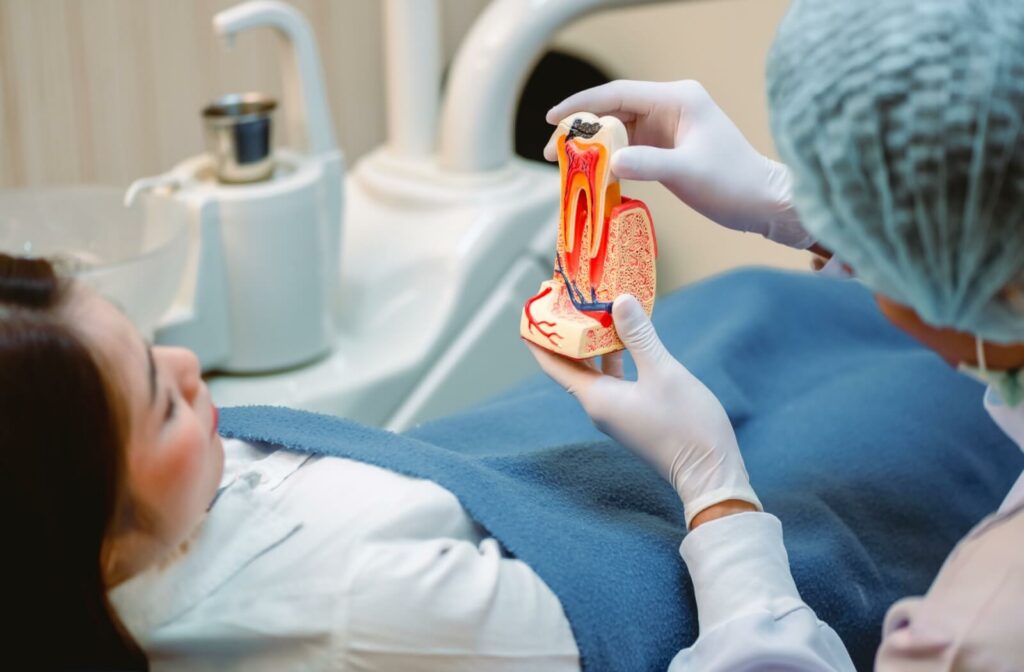Tooth infections, while painful, are sometimes shrugged off as mere inconveniences. But they should never be ignored. Infections can quickly become serious, and in some cases, can even be life-threatening. So what are tooth infections, why are they so serious, and how long does it take before a tooth infection causes serious harm, including death?
It can take up to several months for a tooth infection to develop into an abscess, but if it remains untreated, the infection can spread to other tissues of the body. This can lead to cascading complications and even death in extreme cases.
The key takeaway is to never overlook warning signs of a potential tooth infection. Regular general dental exams can help prevent tooth infections. At Belman Dental Centre, we also treat dental emergencies, so contact us right away if you have a concern.
About Tooth Infection
When the area in or around a tooth gets infected, a dental abscess may form. This happens when pus forms around the tooth, and it can be very painful and spread to other areas of the body.
Three types of dental abscess exist. They are:
- Gingival abscess: An abscess that only affects the gums
- Periodontal abscess: An abscess that begins in the bone tissue
- Periapical abscess: An abscess that begins in the soft pulp
Treatments for a dental abscess may include:
- Antibiotics to kill the infection-causing bacteria
- Draining the tooth, which may help relieve pain
- A root canal, which is a procedure that removes the pulp or soft tissue within the tooth
- In some cases, an extraction is necessary to stop the spread of infection
Causes of Tooth Infections
In general, dental infections happen when bacteria in plaque penetrate the tooth. In periapical abscesses, bacteria enter through holes created by tooth decay, such as cavities.
In periodontal abscesses, bacteria from plaque infect the gums. This is called periodontitis and the gums become inflamed. The tissue around the root of the tooth may even separate from the tooth.
Tooth Infection Symptoms
Symptoms you may experience if you have a dental abscess include:
- Pain, especially when chewing; the tooth itself may also hurt
- Swollen face or jaw
- Swelling inside the mouth, possibly with blood or pus
- Red and inflamed gums
- Fever
- A foul taste in your mouth
As the infection progresses, you may begin to feel less pain because your jaw bone is disintegrating from the infection. It’s important to know that at this stage, the untreated infection is still happening even if you feel less pain. If too much bone loss occurs, the tooth will become loose.
Book an appointment if you’re ever concerned about whether you have a tooth infection. Regular check-ups can also help patients spot problems early and avoid discomfort down the road.
When a Tooth Infection Get Serious

Tooth infections can seriously jeopardize your health if they are not treated quickly. While a dental abscess may take months to build, if left untreated, it can spread to the neck, jaw, or brain and cause more serious complications. Then, death can happen quickly if the condition is left untreated.
Sepsis is when an infection causes the body to respond in a way that damages its own tissues and organs. Patients diagnosed with sepsis will need to be treated in the Intensive Care Unit (ICU) and it’s the twelfth leading cause of death in Canada.
While tooth infections were a major cause of death in earlier times, thanks to modern medicine, death caused by dental abscesses is now very rare.
When to Get Help
Recognizing when to seek medical help can be a lifesaver. A spreading infection can be fatal. Signs that the infection is spreading include:
- Feeling generally sick, such as headache, dizziness, and fatigue
- Chills, sweating, and feverishness
- Rapid heart rate and breathing rate
- Dehydration symptoms, including confusion
- Swelling in the face that obstructs opening your mouth, swallowing, or breathing
- Stomach pain, diarrhea, and vomiting
Seek medical attention right away if you experience these symptoms. You should also seek emergency care if you experience a high fever and if the fever happens alongside other symptoms.
Lowering the Risk of a Tooth Infection
A tooth infection can be serious, but there are proactive things you can do to lower your risk. These include:
- Brushing your teeth twice a day with a fluoride toothpaste
- Flossing every day
- Getting regular dental cleanings and check-ups from your dentist
- Eating healthy and avoiding sugary foods and beverages
- Staying hydrated—dry mouth can raise your risk of developing cavities
- Avoiding tobacco, which increases your risk of gum disease
Tooth Infection & Dental Emergencies at Belman Dental Centre
Tooth infections carry more risks than many imagine. Don’t compromise on your health or wait until you experience pain—make regular dental visits a priority.
If you’re new to regular dental check-ups, don’t worry. Compassionate and judgement-free care is part of our ethos at Belman Dental Centre. Talk to us beforehand if you feel anxious about procedures like root canals and tooth extractions. We can also advise you on how to effectively take care of your teeth so you can better prevent dental complications down the road.
Dental health is an important part of general well-being, so book an appointment today and take a step towards better oral health.



